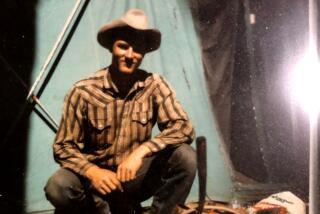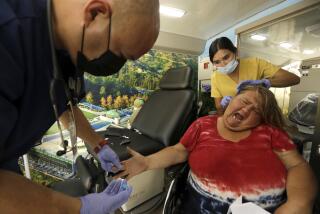In Kentucky, Nurses Call the Shots : Practitioners, Midwives Care for Most in Rural Areas
- Share via
ASHER, Ky. — People seldom say: “Who’s your doctor?” Instead they ask: “Who’s your nurse?” in the mountain river bottoms, valleys and hollows of four southeastern Kentucky counties.
Doctors have always been hard to come by in this slice of rural America. So nurse practitioners and nurse midwives take care of about 80% of the health needs. Only when complicated illnesses, serious injuries or the need for surgery arise are the few physicians in the area called upon.
In fact, many Kentuckians in Leslie, Clay, Harlan and Perry counties have never seen a doctor in their entire lives. They were delivered, and cared for as children and adults by family nurse midwives and family nurse practitioners from the Frontier Nursing Service, a unique 62-year-old Kentucky medical organization.
Sue Lazar, affectionately known by several hundred mountain people as “Nurse Sue” or “the nurse on the middle fork of the Kentucky River” has run the service’s Beech Fork Outpost Clinic on the outskirts of the hamlet of Asher for seven years.
Lazar, 40, a curly-haired blonde, served a year in the thick of fighting in Vietnam as an Army nurse. A native of Lafayette, Ind., she came here from Denver “because I heard of the work of the Frontier Nurses and longed to work in Appalachia.” She and four other women operate the service’s Beech Fork Outpost Clinic serving families scattered for miles around, many living in modest cabins along dirt roads deep in the woods.
The clinic was filled with patients on a recent day--with pregnant women and crying babies, with coal miners suffering from black lung, with men, women and children being treated for diabetes, hypertension, common colds, wasp stings and other ailments.
“Nurse Sue” was in one of the examining rooms with Georgia Hoskins, 32, and her daughter, Tiffany, 5, who cried a river of tears as she received her booster shots and a physical in order to enter kindergarten. She wiped away her tears, smiled and said: “It’s all over. I can go to school now.”
Doyle Roberts, 22, was in the clinic with his pregnant wife, Polly, 18. They were both delivered by the service’s nurses, as were their parents. Soon their child would be delivered in the same manner.
“I feel much more comfortable having a woman nurse than a man doctor delivering my baby,” said Polly.
“We never see a doctor. All we have here is nurses. The nurses live close by. They have always taken care of our family. My granny remembers when they came to the house on horseback,” Doyle said.
It was Mary Breckinridge who introduced nurses on horseback to Leslie County in 1925--a county with 10,000 residents at the time, without a road or an automobile, without one licensed physician, a county with the highest infant mortality rate in the nation.
Breckinridge was a wealthy woman who wanted to do something for the mountain people of Kentucky. Her great-great-grandfather was Thomas Jefferson’s attorney general; her grandfather was John Cabell Breckinridge, vice president of the United States from 1857 to 1861, a Confederate general and Secretary of War for the Confederacy. Her father was U.S. Ambassador to Russia.
She was married to a college professor. They had two children, both of whom died in infancy. After the deaths of her daughter and son, she divorced, took back her maiden name, and decided while in her early 40s to dedicate her life to the children and families of Leslie County. There were no graduate midwifery schools in this country. So, Breckinridge went to England and studied at the British Hospital for Mothers and Babies in London. She returned to the United States, bringing with her the country’s first professional nurse midwives.
“Women in childbirth suffer as much as men in war. Maternity is a young woman’s battlefield. Her pain is terrible and her wounds are often mortal,” she said when she founded Frontier Nursing Service. “It revolts my sense of decency that we should neglect our children and give 18th-Century care to women in childbirth in remotely rural America.”
In 1925, Breckinridge built a large log cabin in the wilderness. It served as her home and headquarters for 40 years until her death at the age of 84 in 1965. She constructed a hospital and health center at nearby Hyden in 1928. Men in the area had raisings and built outpost clinics, the first at Beech Fork in 1926.
The horse and mule were the only means of transportation in this part of Kentucky through the 1940s, and the service’s nurses, their saddlebags filled with medical kits, continued to reach the sick by horseback into the early ‘50s--when roads were finally pushed through and jeeps replaced the horse in the back country.
When mountain children asked where babies came from years ago they were told the nurses bring them in their saddlebags.
Kate Chieco , 38, program officer for the Alexander Fund of the New York Community Trust, was visiting the Beech Ford Outpost Clinic to see its operation firsthand. The New York Community Trust fund organizations in Appalachia.
“We provided a small grant, $10,000 last year, feeling this was a worthy place to put money. These nurses do a remarkable job in this rural area where there are no doctors,” Chieco said.
All of the service’s programs of operate on an $8-million annual budget, according to service president David Hatfield. One million comes from the donations of people across the nation, $1 million from endowments, from the nominal fees charged the families served, from insurance, state and federal Medicare payments and from student tuition at the Frontier School of Midwifery and Family Nursing at Hyden, Hatfield added.
Also at Hyden is the modern 40-bed Mary Breckinridge Hospital, the hub of regional medical care--with four of the service’s outpost clinics in the surrounding mountains, plus two affiliated clinics. Opened in 1970, it is the only hospital in Leslie County, and is staffed by eight physicians and a dozen of the service’s nurses.
The doctors are backups, ready to assist, advise and direct the service’s nurses by phone. A doctor visits each outpost clinic at least once every other week. The service’s nurses have medical books containing protocols developed by doctors and nurse practitioners. The service’s nurses are capable of taking care of 80% of the medical needs of people going to a doctor for help, Hatfield said.
As certified family-nurse midwives and certified family-nurse practitioners, they do far more than a typical nurse in an urban area, according to Ruth Beam, dean of the service’s Nurse Midwifery School. All are graduate R.N.s with experience as working nurses before they enrolled in the 16-month course to become nurse midwives and the year-long course to become nurse practitioners. The service’s Nurse Midwifery School, established by Mary Breckinridge in 1939, is the oldest continuous school of its kind in America, graduating one-fourth of the 2,500 certified nurse midwives in the nation, Beam said. The service’s nurses trained here are working in all 50 states and more than 50 nations.
Betty Lester, 87, has been a member of the service since its founding. Author of “Babies In Her Saddlebag,” Lester has delivered four generations of babies. “I met Mary Breckinridge in England and came over here to work with her for six months to get the program started,” she recalled. “That was 62 years ago and I’m still at it.”
At the service’s Pine Mountain Outpost Clinic, Trudy Morgan, 43, from Newton, Kan., has been in charge six years. Her aunt was a nurse on horseback. Morgan was a nurse at a Livermore, Calif., clinic five years before coming here.
“I like this much better,” she said. “There’s more sense of community. I diagnose and treat, like doctors, the common illnesses nurse practitioners can handle. I’m licensed as an advanced registered nurse practitioner, not just a nurse.”
Newest member of the Pine Mountain staff is a Catholic nun, Katharine Donohue, who came here from Sinsinawa, Wis., where she was a high school biology teacher. “I am still a full-time nun but I also work as a nurse practitioner . . . doing something I have wanted to do for years,” she said.
Cynthia Hodgson, 30, was graduated from the service’s Midwifery School in May. Seven years before coming here, she was an R.N. working in a maternity ward in Cleveland. Now she is delivering babies, working out of the Beech Fork Outpost Clinic.
“In the maternity ward in Cleveland I was frustrated. I wanted to deliver the babies myself. That’s why I came here. I am fulfilling my dream. I have already delivered 40 babies,” said Hodgson, who plans to return to the inner city and work as a midwifery nurse.
For Beech Fork nurse practitioner Lorrie Wallace, 32, originally from Eugene, Ore., “the mountain people are so warm, so wonderful to work with. I like the FNS approach to health care education, teaching people how to take care of themselves.”
Clinic nurse Sue Lazar teaches health education classes to third graders. In the class, she places a tooth into a soft drink. A week later, to the astonishment of the children, the tooth shows marked deterioration. On a plastic model of the human face she demonstrates the residue from cigarette smoke.
“The people here are so special. We become part of their family. They bring us peas, corn, squash and other vegetables from their gardens. They invite us to family gatherings. We make house visits. At regular intervals I stop by the cabin of a 60-year-old blind man and his wife who has multiple sclerosis. The man always tells me: ‘I was hungry for your voice.’ Not long ago he walked me over a mountain to see his sick brother,” Lazar said.
“What we do more than diagnosing and treating is teaching. We have a special background in teaching. Our prime focus is on helping our patients develop healthy life styles, to prevent many of their problems we see such as hypertension, diabetes, malnutrition, those kinds of things.
“A number of people living here still don’t have electricity or indoor plumbing. About half the kids don’t finish high school. . . .”
In the Beech Fork Outpost Clinic with the flu were Vickie Foster, 31, and her sister, Rita Bowling, 27. They were two of eight children delivered by the service’s nurses. Now their children are, too.
“Nurse Sue fixes us up. We have gotten her out of bed at 2 in the morning more than a few times. She’s more than just a nurse. She’s a good friend to all of us in these hills as are all of the FNS nurses,” Foster said.
More to Read
Sign up for Essential California
The most important California stories and recommendations in your inbox every morning.
You may occasionally receive promotional content from the Los Angeles Times.













